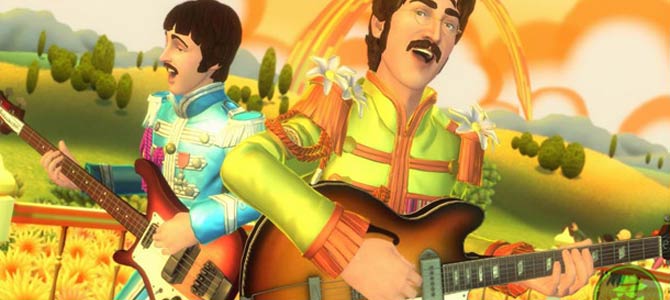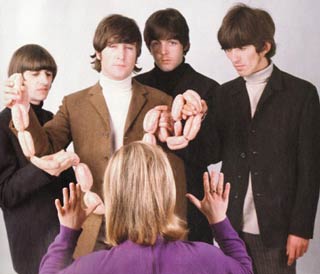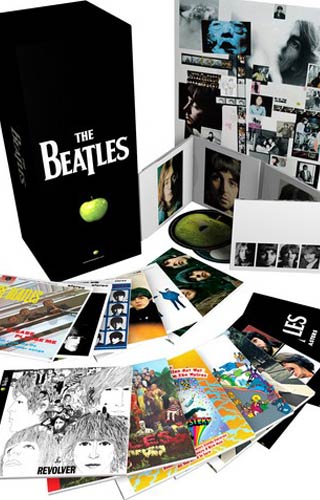Beatles For Sale Again
by Donny Kutzbach

More NEW Beatles product!
It has been 45 years since Beatlemania took root, and the seismic cultural shift caused by John Lennon, Paul McCartney, George Harrison, and Ringo Starr simply can’t be overemphasized.
Forty-five years is long time, especially in the fickle, ageist sphere of rock and roll. Rock-and-roll artists are lucky to last 45 months. Hell, 45 weeks can be an epic run.

The Beatles changed not only popular music on a global scale but how the world thought about politics, religion, philosophy, sexuality, language, fashion, and on and on and on. Staggeringly, they still do.
The luster of the Fab Four’s elemental music—all recorded in the compact stretch of seven years—hasn’t worn off, and if you doubt the band’s near half century of dominance, look at the latest chapter of Beatlemania just upon us in 2009.
Last week saw the Beatles’ first appearance as a video game: Courtesy of The Beatles: Rock Band, millions of kids will pick up plastic instruments and emulate the four lads who were essentially the template for the whole ideology of rock stardom.
The video game is a big deal and bound to be a lot of fun, and to be a gateway to help carry that weight of the Beatles legacy for years. But it’s a sideshow to the other Beatles “new” releases that hit stores on 9/9/09 (and if you don’t get the sly reference in that release date, you are not a hardcore fan).
After a painstaking four years overseen by the band’s imprint Apple Corps and original label EMI, every note of studio-recorded and officially released Beatle music has been remastered to meet the latest standards in sonic technology and refinement.
What does this mean? Depends.
Some see it as another attempt to cash in on an enduring but already well-served catalog. Others see it as the chance to hear the Beatles for the first time all over again.
After a few days of intensive if completely unscientific listening to both the stereo and mono reissues, my results are in: These sound simply amazing.
As I write this, I’m poring over the differences and finer points in the mono and stereo versions of Magical Mystery Tour—arguably the most underrated album in the Fabs’ catalog. Pound for pound it is an equal to Sgt. Pepper, though “always the bridesmaid” in the band’s catalog.
If you’re reading this, I don’t need to tell you why “I Wanna Hold Your Hand” or “She Said, She Said””or “A Day in the Life” or “While My Guitar Gently Weeps” are brilliant, so I’ll skip that.
One quick primer or refresh: Mono—or monaural—is a single-path sound mix originally designed to be broadcast through a single speaker, like the one on a good old AM transistor radio. Stereo signifies two separate channels, giving the sound mix the ability to be distinct and nuanced, and to come from different sides: Think FM radio and headphones.

Every album through the 1967’s The Beatles (a.k.a. The White Album) was initially mixed by feted Fabs producer George Martin with the intent of that it would heard in mono. Then stereo came into fashion, took hold, and dominated. As a result we have heard the Beatles through somewhat skewed constraints.
Beatles in mono reflects a purity, the way much of this music was meant to be heard. There are unquestionably wonderful aspects of hearing the Beatles in mono, where everything is rich, dynamic, and unfettered by the occasional trickiness of stereo mixing. Early albums like Hard Day’s Night and Beatles for Sale, which have always been poorly served by lame stereo mixes, are especially mind-blowing in their original mono.
Alas, the mono versions will continue to be second fiddle to the stereo mixes. The mono versions are only available as one set of 10 albums (the non-mono Let It Be and Abbey Road do not figure) plus two discs of singles in The Beatles in Mono, which has a hefty price tag and is already proving scarce.
The Beatles in Mono will appeal to the diehards who have to hear these “pure” mono mixes and who will salivate over the exclusive book and the scaled-down, 100-percent faithful recreations of the original packaging from LP jackets and original artwork right down to labels, inner sleeves, and inserts.
So now that I’ve blathered and stumbled on over the monos like a drunken fanboy, onto stunning new stereo remasters, each of which is available individually.
These are truly worth freaking out over.
Every section of Abbey Road’s vaunted Side Two medley—from “You Never Give Me Your Money” through “The End”—unfolds from the speakers. The clarity and deliberateness of this remaster elicits goosebumps, from the prickly acoustic guitar of “Polythene Pam” to the moment the drums come in on “Golden Slumbers.”
The overall sound quality makes these remasters worth hearing. The whole of the Beatles studio work was last refreshed in 1988. As technology has improved, so too has the ability to sonically improve music that is already virtually perfect.
Give the old A-B test to any of these new stereo remasters compared to your circa 1988 discs, and if you can’t hear the difference, well…you might want to see if there are cotton balls stuck in your ears.
In addition to new liner notes and a bevy of unseen photos, included are mini-documentaries for each album—added fluff and fun embedded as QuickTime movies on the reissue CDs and included as a separate DVD in The Beatles in Stereo box set. These offer little new insight but prove to be dazzling little vignettes that peek into the state of the Fabs and their frames of mind for each respective record.
As McCartney posits in the new mini-documentary included with Sgt. Pepper, “I maintain that the Beatles weren’t leaders of the generation but the spokesmen.”
It’s no small feat that this music is still speaking to that generation and has spoken to every generation every one since. If people still feel this way about the Beatles’ music nearing a half century, it’s easy to imagine the world will still be enthralled by the Liverpool lads in a hundred. Maybe 200 years from now. Maybe beyond.
“Turn me on, dead man” indeed.
blog comments powered by Disqus|
Issue Navigation> Issue Index > v8n38 (week of Thursday, September 17, 2009) > Beatles For Sale Again This Week's Issue • Artvoice Daily • Artvoice TV • Events Calendar • Classifieds |









 Current Issue
Current Issue